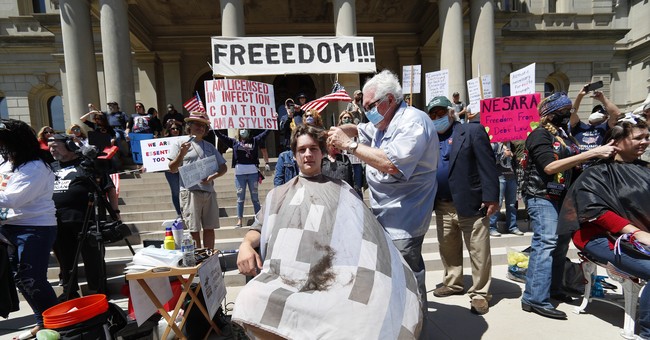
“I have always found those who would thrust theory into practical matters to be, at bottom, men of no judgement and pure quacks.”
— Eminent physicist and father of civil engineering, John Smeaton, 1759
***
A top British epidemiologist serving on the UK’s official panel of COVID-19 advisors just admitted that imposing lockdown turned out to be a catastrophic mistake that ought never be repeated.
University of Edinburgh professor, Mark Woolhouse couldn’t have been clearer about how much he regrets his recommendations:
“Lockdown was a panic measure and I believe history will say trying to control Covid-19 through lockdown was a monumental mistake on a global scale, the cure was worse than the disease.
I never want to see national lockdown again.
I believe the harm lockdown is doing to our education, health care access, and broader aspects of our economy and society will turn out to be at least as great as the harm done by Covid-19.”
The UK may have been pushed into implementing the same suicidal response to COVID-19 as we were in the U.S. But at least some of their bureaucrats are admitting the obvious and trying to fully grasp how badly they erred to make sure it never happens again.
Study by British gov. says lockdown may kill 200,000 brits.
Turns out other things kill people besides C-19. Crazy, huh?https://t.co/OiTFP03ibp pic.twitter.com/NmxFD4dXm1— Michael Thau (@MichaelThau) August 1, 2020
Whereas doubling down and covering up is all we seem to be getting from our reprehensible lot on this side of the Atlantic.
But, as welcome as Professor Woolhouse’s confession is, that doesn’t mean we should let him and the other supposed “experts” who got most of the western world to self-immolate over a virus less deadly to young and healthy people than the flu off the hook.
Woolhouse’s justification for giving his now admittedly disastrous advice proves the monumental stupidity of placing our fate in the hands of a bunch of academic “researchers” – people who spend their lives frolicking about in the land of abstract ideas because they can’t stand the sharp edges and hard falls inevitably suffered when grappling with concrete problems in the real world of results:
At the time I agreed with lockdown as a short term emergency response because we couldn’t think of anything better to do, but it was always clear that the moment we started to relax enough measures we were likely to see infection rates rise again either nationally or locally.
He knew all along that as soon as lockdown ended infection rates would just start climbing again.
He explicitly admits it was worse than the disease.
And why did Professor Woolhouse inflict such woefully bad medicine on 70 million of his countrymen?
Because he couldn’t think of anything better to do.
I have a friend who had a grease fire in his kitchen. In a panic and, like Professor Woolhouse unable to think of anything better to do, he tried putting it out with water.
The burning grease, of course, splattered everywhere.
And as the walls of his kitchen started going up in flames, he learned the wisdom of the advice Ronald Reagan is said to have given to a government colleague:
Don’t just do something, stand there.
***
You may remember all those media reports that the U.S. would suffer two million fatalities from COVID-19 if we didn’t lock the whole place down. That figure came from a computer model produced by another highly-esteemed British college professor, Neil Ferguson of London’s Imperial University.
The former head of Europe’s CDC rightly labeled Ferguson’s report on his model’s projections “the most influential scientific paper” in memory. High praise if he hadn’t also described it as, “one of the most wrong.”
Ferguson had to resign from the UK’s COVID task force when it emerged that he’d violated his own lockdown rules to visit another guy’s wife he happened to be sleeping with. Just like our very own Anthony Fauci and his enablers in the U.S., Ferguson clearly doesn’t believe a word of the BS he’s peddled about COVID-19’s unprecedented deadliness and the drastic rules we need to religiously follow to stay safe.
But the fact that anyone else did is a sign of a very serious problem.
Far from being believed, Ferguson should have been fired in disgrace and maybe even spent some time behind bars 15 years ago, the first time his “expert advice” rained down untold ruin on the heads of the British people.
John Fund writing over at National Review gave a nice summary of the kind of track record you can have and still be one of the world’s “top epidemiologists”:
In 2002, Ferguson predicted that, by 2080, up to 150,000 people could die from exposure to BSE (mad cow disease) in beef. In the U.K., there were only 177 deaths from BSE.
Over 6 million cattle, sheep, and pigs were needlessly slaughtered because the UK’s leaders listened to “expert epidemiologist,” Neil Ferguson’s worthless opinion.
In 2009, a government estimate, based on Ferguson’s advice, said a “reasonable worst-case scenario” was that the swine flu would lead to 65,000 British deaths. In the end, swine flu killed 457 people in the U.K.
Last March, Ferguson admitted that his Imperial College model of the COVID-19 disease was based on undocumented, 13-year-old computer code that was intended to be used for a feared influenza pandemic, rather than a coronavirus. Ferguson declined to release his original code so other scientists could check his results. He only released a heavily revised set of code [at the end of April], after a six-week delay.
The computer code that produced Ferguson’s projection of 2 million dead Americans if we didn’t lockdown in response to COVID-19 was eventually analyzed by a tech expert who eviscerated it as amateurish garbage. A British MP posted her analysis to Twitter, urging everyone to read it and decrying Ferguson’s work as “scandalous.”
Everybody who is concerned about the Imperial College model must read this immediately. If true, it is scandalous.https://t.co/Y2SphE228u
— David Davis (@DavidDavisMP) May 6, 2020
It turns out that, “[d]ue to bugs, [Ferguson’s] code can produce very different results given identical inputs.” For example, a team at another University discovered that merely storing the data in a different format caused the predictions to vary by 80,000 deaths after 80 days!
But Ferguson’s team didn’t even notice because “their code is so deeply riddled with similar bugs and they struggled so much to fix them that they got into the habit of simply averaging the results of multiple runs to cover it up.”
Her evisceration of the “epidemiological” model used to drive the U.S. and most of the rest of the western world off a cliff concludes with a remark that will likely sound crazy to a lot of folks trained since birth to worship the opinion of college professors.
But if we don’t want to see our country crushed to death under the weight of more disastrous “expert advice,” that’s something we all need to get over fast:
All papers based on this code should be retracted immediately. Imperial’s modelling efforts should be reset with a new team that isn’t under Professor Ferguson, and which has a commitment to replicable results with published code from day one.
On a personal level, I’d go further and suggest that all academic epidemiology be defunded. This sort of work is best done by the insurance sector. Insurers employ modellers and data scientists, but also employ managers whose job is to decide whether a model is accurate enough for real world usage and professional software engineers to ensure model software is properly tested, understandable and so on.
Academic efforts don’t have these people, and the results speak for themselves.
Ferguson continued to have clout despite his disastrous record of bone-headed projections because he’s one of the world’s leading “epidemiologists.”
He’s been producing garbage for two decades that’s rained down immeasurable carnage on the world.
Yet, somehow, none of that stopped Neil Ferguson from rising to the very top of his field. Nor was there any huge pushback against his wretched kindergarten level work from his “epidemiologist” colleagues.
The problem isn’t just Neil Ferguson. It’s also the joke of an “academic discipline” that hailed him as one of its brightest lights.
One notable exception, however, was Standford University’s John Ioannidis, who’s been pointing out how stupendously stupid the decision to lockdown was since his March 17, op-ed:
A fiasco in the making? As the coronavirus pandemic takes hold, we are making decisions without reliable data.
Not coincidentally, Ioannidis has also been sounding the alarm about the “replicability crisis” in science since 2005, when he published his landmark paper,
Why Most Published Research Findings Are False.
As Stat News reported 8 months before we let Neil Ferguson drive us off a cliff with his worse-than-shoddy computer model:
Of the most widely cited health research studies of the last decade, [Ioannidis] found that only a minority could be replicated, and at least 1 in 6 had actually been contradicted by later studies.
Andrew Ferguson (no relation) wrote about Ioannidis’ findings on how worthless so much scientific research is in a 2015 piece whose three-word title, “Making it all up,” nicely sums up Ioannidis’ disturbing revelations about the state of academic science:
The widespread failure to replicate findings has afflicted physics, chemistry, geology, and other real sciences.
Worth noting that Standford lockdown skeptic John Ioannidis also brought to light the wretched state of scientific research in his landmark 2005 paper,
"Why Most Published Research Findings Are False." https://t.co/raA3FlXCcQ— Michael Thau (@MichaelThau) August 25, 2020
That may surprise a lot of people who’ve been taught to have unconditional faith in anything labeled “science.”
But, why would you expect academic “research” to be reliable when literally no one is checking to see that it is or making sure people suffer consequences when it’s not?
We’ve been taught to view “scientists” not merely as intellectually superior, but also as moral saints, immune to temptation and the vices affecting all the rest of us mere mortals.
Everyone knows there are incompetent and even outright crooked auto mechanics.
When choosing an accountant or a dentist, people ask around to make sure they find someone on the up and up.
But if some random stranger with the label “scientist” tells them it’s a good idea, they’ll happily pour water on a grease fire and then proudly call anyone pointing to the splashes of flame consuming their home and begging them to stop a “science denier.”
As I wrote way back in 2016 based on my awful 2-decades of experience among academics:
The overwhelming majority of university professors are people who were very good at school but not much else. Almost none of my colleagues had ever had a job outside of school; almost to a person, an academic career was a way of staying in school and avoiding the difficulties of having to work with others to achieve real world results. In school, we excelled at writing papers that served no purpose besides being testaments to our cleverness. Eventually, I began to see that academic research is largely just a continuation of these meaningless scholastic exercises for those who lack the wherewithal to do anything else.
My point was how bad of an idea it is to put people like that in charge of preparing young adults for the challenges they’ll face in trying to create and maintain a happy life once they’re out of school.
But it’s obviously no less of a lousy idea to let people like that impose their will on the entire nation.
Most sensible folks know the humanities have become a dumping ground for the lazy and incompetent.
But the lunatic response to COVID-19 of locking down the world has shown that academic departments with scientific-sounding names that end with “iology” are just as rife with hacks and charlatans as those with unscientific ones ending in “Studies.”
It was incredibly painful and the awful consequences are far from even over.
But we also got an abject lesson that ceding authority to such charlatans is about the worst thing you can do.














